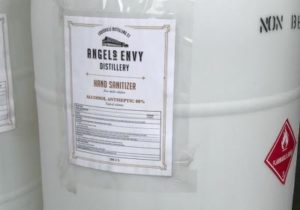Most U.S. distilleries stopped making bourbon and other spirits during World War II. The federal government required them to make industrial strength alcohol that was used for antiseptic, antifreeze, ammunition, synthetic rubber, and other supplies for the war effort.
 Today, there’s no government mandate, but many Kentucky distilleries are again pitching in to help the country through tough times. In Louisville, Angel’s Envy, the Evan Williams Bourbon Experience, Rabbit Hole, and Old Forester are among the distillers that have converted at least part of their production process to make hand sanitizer.
Today, there’s no government mandate, but many Kentucky distilleries are again pitching in to help the country through tough times. In Louisville, Angel’s Envy, the Evan Williams Bourbon Experience, Rabbit Hole, and Old Forester are among the distillers that have converted at least part of their production process to make hand sanitizer.
For example, Kyle Henderson, Angel’s Envy Distillery Manager, said her company has been working to address the critical sanitizer need by making about 1,000 gallons a day.
Louisville Water often promotes its partnerships with distilleries. We may be the only water utility in the world with a special bourbon section on our website, and just as we’re proud our product has been used to make some of the world’s best bourbons, we’re honored that our water is playing a role as distilleries produce a potentially life-saving product.
“We use Louisville’s water in the cooking/distilling process while making our hand sanitizer,” Henderson said. “We provide it to first responders, healthcare, and shipping personnel who are out there on the frontlines helping the community.”
An article in The Courier-Journal explained how hand sanitizer is made at the Evan Williams Bourbon Experience, which is owned by Heaven Hill Brands: “The process starts in one of the tanks they use for bourbon production, but it doesn’t end in a rickhouse and years of aging. Essentially, Heaven Hill’s neutral grain spirit is cut with water in the mixing tank and then combined with hydrogen and peroxide before being taken down to the speakeasy for bottling and labeling. The process Heaven Hill follows adheres to the FDA guidelines for producing hand sanitizer.”
According to the Kentucky Distillers’ Association (KDA), “the FDA-approved formulation requires alcohol ‘in an aqueous solution denatured,’” which means it has to be unsuitable for human consumption — so the distilleries “are using water in some capacity for the hand sanitizer, whether to proof down the alcohol or in the denaturing process,” said Mary E. Gratzer, Director of the Kentucky Bourbon Affair for the KDA.
She also noted that the association created an online system to manage distribution of hand sanitizer from its members.
“We worked with the state to launch a page to collect requests, and then our distilleries can log in to make the connection and assist,” Gratzer said. “It had over 300 requests in 24 hours!”

